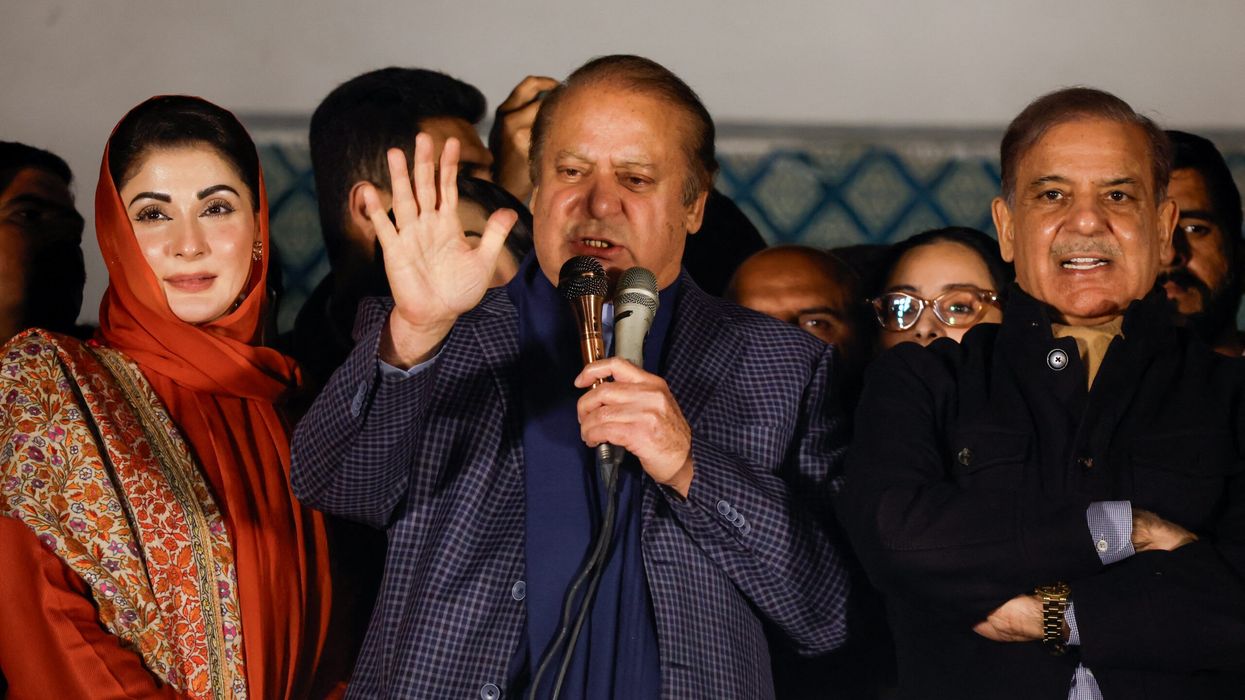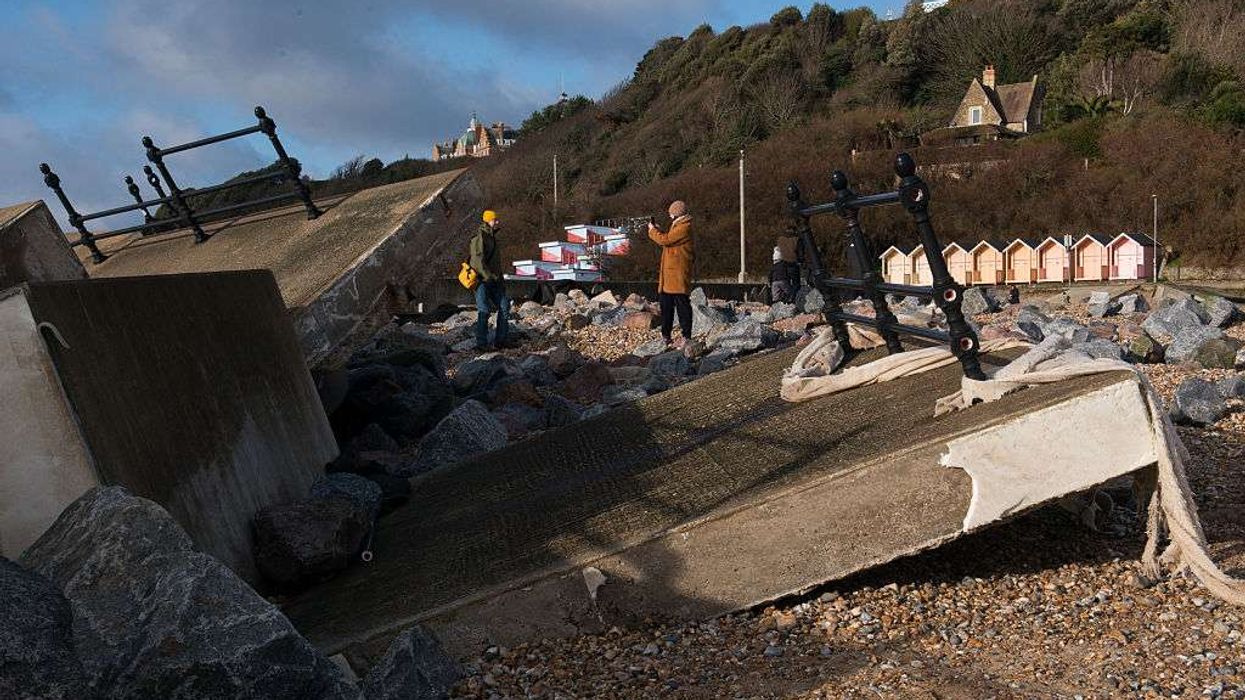Pakistan's two main political parties that joined forces to oust Pakistan Tehreek-e-Insaf (PTI) party founder Imran Khan as prime minister in 2022 have said they would form a new coalition to rule the country, after an election last week failed to produce a decisive winner.
With the army-backed Pakistan Muslim League-Nawaz (PML-N) short of votes to win a ruling majority, it said it was partnering with Pakistan Peoples Party (PPP) as well as a handful of smaller parties to form the next government.
Loyalists of Khan, jailed on corruption charges, won the most seats as independent candidates in Thursday's election.
"The parties present here are almost two-thirds of the house that has been elected," said Shehbaz Sharif, president of the PML-N, alongside leaders of the PPP and two other groups, and representatives from two more.
Sharif said the PML-N was even willing to talk to Khan to include his Pakistan Tehreek-e-Insaf (PTI) party in the next government. "Forget and forgive; forgive and forget -- come let's join hands for the betterment of the country," he said.
"Sacrifice self-interests set the issue of egos aside."
Shehbaz made premier candidate
However, in a surprise development, PML-N nominated Shehbaz Sharif as the prime ministerial candidate, instead of the party supremo and three-time former premier Nawaz Sharif.
Taking to X, formerly Twitter, PML-N spokesperson Marriyum Aurangzeb said the party chief Nawaz Sharif, 74, has nominated his younger brother Shehbaz Sharif, 72, as candidate for prime minister and his daughter Maryam Nawaz, 50, for chief minister of Punjab province.
"Nawaz Sharif has thanked the political parties which provided support to the PML-N (in forming the upcoming government) and expressed hope that through such decisions Pakistan will come out of crises," she said.
The development comes a few hours after Pakistan Peoples Party (PPP) chairman Bilawal Bhutto-Zardari withdrew from the prime ministerial race, saying his party would support ex-premier Nawaz without being part of the new government.
Interestingly, during the press conference, Shehbaz had said that he wanted his older brother Nawaz to return to office.
Mandate stolen, says PTI
Khan's party on Wednesday alleged that its “mandate has been stolen in the dark of the night” after major political parties in the country decided to form a coalition government led by PML-N President Shehbaz Sharif.
PTI's Central Information Secretary Raoof Hasan said that Imran's “mandate has been stolen in the dark of the night”. In a post on X, Hasan said, “Pakistan is being put on [the] road to further destabilisation.”
Referring to a possible coalition government led by the PML-N, he said, “The decision to induct a bunch of criminals to form governments, who have been rejected by the people, reflects a myopic view of the grave challenges the country is beset with.”
The PTI spokesperson said the current situation was “striking at the very essence of democratic principles and norms”, as well as reflected a “disdain for the national interests and the welfare of its people”.
“Forces of dark must be stopped and power must pass on to those whom the people have chosen as their leaders,” Hasan added.
Earlier, speaking during a court appearance at Adiala Jail on Tuesday, Khan told reporters, "We will neither sit with the PML-N nor with the PPP."
PPP wants Zardari to be president
The press conference by PML-N and PPP left a lot of unanswered questions about who would fill key positions in the next government and made clear there was still much negotiating to be done.
"We have decided today that we will get together and form the government to lift Pakistan from difficulty," Asif Ali Zardari, PPP co-chairman and former Pakistan president told the press conference.
PPP chairman Bilawal Bhutto Zardari, the son of Zardari and assassinated former prime minister Benazir Bhutto, said he would like to see his father become president again as he has the capacity to handle the current situation.
Rigging allegations
Candidates loyal to Khan took most of the seats in the polls, defying a months-long crackdown that crippled campaigning and forced them to run as independents.
But despite independents winning 101 national assembly seats, a government can only be formed by a recognised party, or coalition of parties, so they would have to join another group to become an effective bloc.
There were widespread allegations of vote-rigging and result manipulation after authorities switched off the nation's mobile phone network on election day, ostensibly on security grounds, and the count took more than 24 hours.
"We are going to challenge the election rigging in the Supreme Court of Pakistan, and we will consider the alliance later," Khan said Tuesday.
The restive Balochistan province has come to a standstill with several political and nationalist parties launching an indefinite blockade of all national highways from Wednesday against alleged rigging of the election results.
Coalition has numbers
According to the Election Commission of Pakistan's tally, the total number of general seats won by the six parties -- the PML-N, PPP, MQM-P, PML-Q, IPP (Istehkam-e-Pakistan Party) and Balochistan Awami Party (BAP), which announced their plans to form a coalition led by Shehbaz -- comes to 152.
This clearly shows that these parties will easily achieve the minimum required number of 169 to form the government at the Centre after the addition of 60 women and 10 minority seats in their tally.
However, it is yet to be seen if these parties will be able to get to the next magic number of 224, which is required to obtain the elusive two-thirds majority in a 336-member National Assembly. (Agencies)













